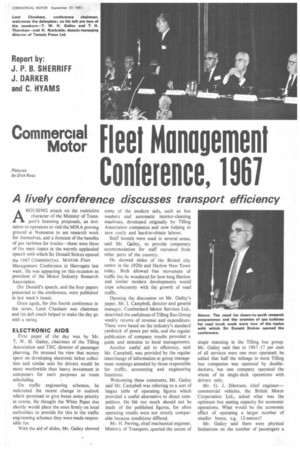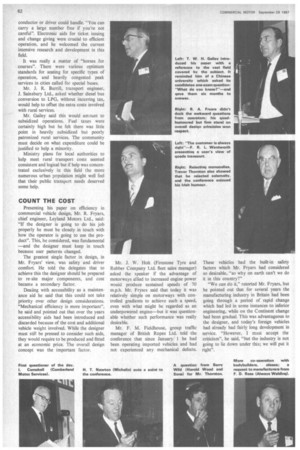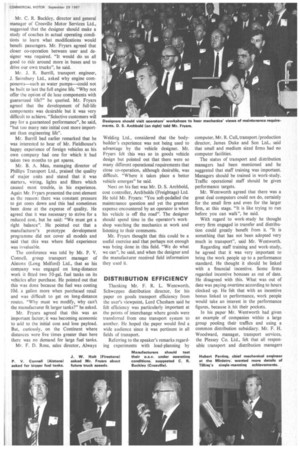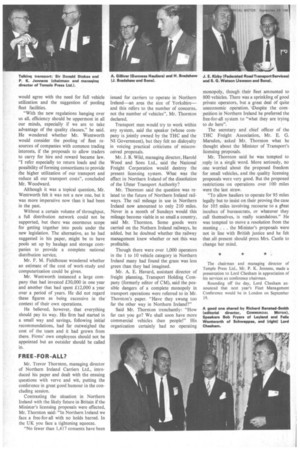Comma:a fleet Management Conference, 1967
Page 63

Page 64

Page 65

Page 66

If you've noticed an error in this article please click here to report it so we can fix it.
Pictures by Dick Ross
A lively conference discusses transport efficiency
AROUSING attack on the restrictive character of the Minister of Transport's licensing proposals, an invitation to operators to visit the MIRA proving ground at Nuneaton to see research work for themselves, and a forecast of the benefits of gas turbines for trucks—these were three of the main topics in the warmly applauded speech with which Sir Donald Stokes opened the 1967 COMMERCIAL MOTOR Fleet
Management Conference in Harrogate last week. He was appearing on this occasion as president of the Motor Industry Research Association.
(Sir Donald's speech, and the four papers presented to the conference, were published in last week's issue).
Once again, for this fourth conference in the series, Lord Chesham was chairman and his deft touch helped to make the day go with a swing.
ELECTRONIC AIDS
First paper of the day was by Mr. T. W. H. Galley, chairman of the Tilling Association and THC director of passenger planning. He stressed his view that money spent on developing electronic ticket collection and similar aids for drivers would be more worthwhile than heavy investment in computers for such purposes as route scheduling.
On traffic engineering schemes, he welcomed the recent change in outlook which promised to give buses some priority in towns. He thought the White Paper due shortly would place the onus firmly on local authorities to provide for this in the traffic engineering schemes they were made responsible for.
With the aid of slides, Mr. Galley showed some of the modern aids, such as bus washers and automatic interior-cleaning machines, developed originally by Tilling Association companies and now helping to save costly and hard-td-obtain labour.
Staff hostels were used in several areas, said Mr. Goiley, to provide temporary accommodation for staff recruited from other parts of the country.
He showed slides of the Bristol city centre in the .1920s and Harlow New Town today. Both allowed free movement of traffic but he wondered for how long Harlow and similar modern developments would cope adequately with the growth of road traffic.
Opening the discussion on Mr. Gailey's paper, Mr. I. Campbell, director and general manager, Cumberland Motor Services Ltd., described the usefulness of Tilling Bus Group weekly returns of revenue and expenditure. These were based on the industry's standard yardstick of pence pet mile, and the regular publication of company results provided a guide and stimulus to local managements.
Another useful aid to efficiency, said Mr. Campbell, was provided by the regular interchange of information at group management meetings attended by those responsible for traffic, accounting and engineering functions.
Welcoming these comments, Mr. Galley said Mr. Campbell was referring to a sort of league table of operating figures which provided a useful alternative to direct competition. He felt too much should not be made of the published figures, for often operating results were not strictly comparable because conditions differed.
, Mr. H. Perring, chief mechanical engineer. Ministry of Transport, queried the extent of single manning in the Tilling bus group. Mr. Galley said that in 1967 17 per cent of all services were one man operated; he added that half the mileage in most Tilling bus companies was operated by doubledeckers, but one company operated the whole of its single-deck operations with drivers only.
Mr. G. J. Ibbotson, chief engineer— commercial vehicles, the British Motor 'Corporation Ltd., asked what was the optimum bus seating capacity for economic operations. What would be the economic effect of operating a larger number of smaller buses, e.g. 12-seaters?
Mr. Galley said there were physical limitations on the number of passengers a conductor or driver could handle. "You can carry a large number free if you're not careful". Electronic aids for ticket issuing and change giving were crucial to efficient operation, and he welcomed the current intensive research and development in this field.
It was really a matter of "horses for courses". There were various optimum standards for seating for specific types of operation, and heavily congested peak services in cities called for special buses.
Mr. J. R. Burrill, transport engineer, J. Sainsbury Ltd., asked whether diesel bus conversion to LPG, without incurring tax, would help to offset the extra costs involved with rural services.
Mr. Gailey said this would amount to subsidized operations. Fuel taxes were certainly high but he felt there was little point in heavily subsidized but poorly patronized rural services. The community must decide on what expenditure could be justified to help a minority.
Ministry plans for local authorities to help meet rural transport costs seemed consistent and logical but if help was concentrated exclusively in this field the more numerous urban population might well feel that their public transport needs deserved some help.
COUNT THE COST
Presenting his paper on efficiency in commercial vehicle design, Mr. R. Fryars, chief engineer, Leyland Motors Ltd., said: "If the designer is going to do his job properly he must be closely in touch with how the operator is going to use the product". This, he considered, was fundamental —and the designer must keep in touch because user patterns changed.
The greatest single factor in design, in Mr. Fryars' view, was safety and driver comfort. He told the delegates that to achieve this the designer should be prepared to re-site major components, and cost became a secondary factor.
Dealing with accessibility as a maintenance aid he said that this could not take priority over other design considerations. "Mechaniml efficiency is more important", he said and pointed out that over the years accessibility aids had been introduced and discarded because of the cost and additional vehicle weight involved. While the designer must still be pressed to consider such aids, they would require to be produced and fitted at an economic price. The overall design concept was the important factor.
Mr. J. W. Holt (Firestone Tyre and Rubber Company Ltd. fleet sales manager) asked the speaker if the advantage of motorways allied to increased engine power would produce sustained speeds of 70 m.p.h. Mr. Fryars said that today it was relatively simple on motorways with controlled gradients to achieve such a speed, even with what might be regarded as an underpowered engine—but it was questionable whether such performance was really desirable.
Mr. F. M. Fieldhouse, group traffic manager of British Ropes Ltd. told the conference that since January 1 he had been operating imported vehicles and had not experienced any mechanical defects. These vehicles had the built-in safety factors which Mr. Fryars had considered so desirable,."so why on earth can't we do it in this country?"
"We can do it," retorted Mr. Fryars, but he pointed out that for several years the manufacturing industry in Britain had been going through a period of rapid change which had led in some instances to inferior engineering, while on the Continent change had been gradual. This was advantageous to the designer, and today's foreign vehicles had already had fairly long development in service. "However, I must accept the criticism", he said, "but the industry is not going to lie down under this; we will put it right". • Mr. C. R. Buckley, director and general manager of Crosville Motor Services Ltd., suggested that the designer should make a study of coaches in• actual operating conditions to learn what modifications would benefit passengers. Mr. Fryars agreed that closer co-operation between user and designer was required. "It would do us all good to ride around more in buses and to drive our own trucks", he said.
Mr. J. R. Burrill, transport engineer, J. Sainsbury Ltd., asked why engine components—such as water pumps—could not be built to last the full engine life. "Why not offer the option of de luxe components with guaranteed life?" he queried. Mr. Fryars agreed that the development of full-life components was desirable but it was very difficult to achieve. "Selective customers will pay for a guaranteed performance", he said, "but too many rate initial cost more important than engineering life".
Mr. Burrill had earlier remarked that he was interested to hear of Mr. Fieldhouse's happy experience of foreign vehicles as his own company had one for which it had taken two months to get spares.
Mr. B. A. Mau, managing director of Phillips Transport Ltd., praised the quality of major units and stated that it was starters, wiring, lights and filters which caused most trouble, in his experience. Again Mr. Fryars presented the cost element as the reason: there was constant pressure to get costs down and this had sometimes been done at the expense of quality. He agreed that it was necessary to strive for a reduced cost, but he said: "We must get a right balance". He pointed out that a manufacturer's prototype development programme did not cover all models and said that this was where field experience was invaluable.
The conference was told by Mr. P. V. Connell, group transport manager of Alstons (Long Melford) Ltd., that as his company was engaged on long-distance work it fitted two 50-gal. fuel tanks on its vehicles after purchase. He pointed out that this was done because the fuel was costing 10d. a gallon more when purchased retail and was difficult to get on long-distance routes. "Why must we modify, why can't the manufacturer fit larger tanks?" he asked.
Mr. Fryars agreed that this was an important factor; it was becoming economic to add to the initial cost and lose payload. But, curiously, on the Continent where distances were five times greater than here there was no demand for large fuel tanks, Mr. F. D. Ross, sales director, Always Welding Ltd., considered that the bodybuilder's experience was not being used to advantage by the vehicle designer. Mr. Fryars felt this was so in goods vehicle design but pointed out that there were so many different operational requirements that close co-operation, although desirable, was difficult. "Where it takes place a better vehicle emerges" he said.
Next on his feet was Mr. D. S. Archbold, cost controller, Archbolds (Freightage) Ltd. He told Mr. Fryars: "You soft-pedalled the maintenance question and yet the greatest expense encountered by an operator is when his vehicle is off the road". The designer should spend time in the operator's workshop watching the mechanics at work and listening to their comments.
Mr. Fryars thought that this could be a useful exercise and that perhaps not enough was being done in this field. "We do what we can", he said, and when the designer and the manufacturer received field information they used it.
DISTRIBUTION EFFICIENCY
Thanking Mr. F. R. L. Wentworth, Schweppes distribution director, for his paper on goods transport efficiency from the user's viewpoint, Lord Chesham said he • felt efficiency was particularly important at the points of interchange where goods were transferred from one transport system to another. He hoped the paper would find a wide audience since it was pertinent in all fields of transport.
Referring to the speaker's remarks regarding experiments with load-planning by computer, Mr. R. Cull, transport /production director, James Duke and Son Ltd., said that small and medium sized firms had no computer facilities.
The status of transport and distribution managers had been mentioned and he suggested that staff training was important. Managers should be trained in work-study. Traffic operational staff should be given performance targets.
Mr. Wentworth agreed that there was a great deal computers could not do, certainly for the small firm and even for the larger firm, at this stage. "It is like trying to run before you can walk", he said.
With regard to work-study he thought every firm engaged in transfer and distribution could greatly benefit from it. "It is something that has not been adopted very much in transport", said Mr. Wentworth.
Regarding staff training and work-study, he agreed that it was very important to bring the work people up to a performance standard. He thought it should be linked with a financial incentive. Some firms regarded incentive bonuses as out of date. He disagreed with this. What was out of date was paying overtime according to hours clocked up. He felt that with an incentive bonus linked to performance, work people would take an interest in the performance figures, because it hit their pockets.
In his paper Mr. Wentworth had given an example of companies within a large group pooling their traffics and using a common distribution subsidiary. Mr. F. H. Woodward, manager, transport services, the Plessey Co. Ltd., felt that all responsible transport and• distribution managers would agree with the need for full vehicle utilization and the suggestion of pooling fleet facilities.
"With the new regulations hanging over us all, efficiency should be uppermost in all our minds, especially if we are to take advantage of the quality clauses," he said. He wondered whether Mr. Wentworth would consider the pooling of fleet resources of companies with common trading interests, if the proposals to allow traders to carry for hire and reward became law. "I refer especially to return loads and the possibility of forming consortiums to provide the higher utilization of our transport and reduce all our transport costs", concluded Mr. Woodward.
Although it was a topical question, Mr. Wentworth felt it was not a new one, but it was more imperative now than it had been in the past.
Without a certain volume of throughput, a full distribution network could not be supported, but there was enormous scope for getting together into pools under the new legislation. The alternative, as he had suggested in his paper, might be to have pools set up by haulage and storage comL panics to provide a complete national distribution service.
Mr. F. M. Fieldhouse wondered whether an estimate of the cost of work-study and computerization could be given.
Mr. Wentworth instanced a large company that had invested £30,000 in one year and another that had spent £12,000 a year over a period of years. He did not regard these figures as being excessive in the context of their own operations.
He believed, however, that everything should pay its way. His firm had started in a small way and savings, following initial recommendations, had far outweighed the cost of the team and it had grown from there. Firms' own employees should not be appointed but an outsider should be called in.
FREE-FOR-ALL?
Mr. Trevor Thornton, managing director of Northern Ireland Carriers Ltd., introduced his paper and dealt with the ensuing questions with verve and wit, putting the conference in great good humour in the concluding session.
Contrasting the situation in Northern Ireland with the likely future in Britain if the Minister's licensing proposals were effected, Mr. Thornton said: "In Northern Ireland we face a free-for-all with no holds barred. In the UK you face a tightening squeeze.
"No fewer than 1,417 consents have been issued for carriers to operate in Northern Ireland—an area the size of Yorkshire— and this refers to the number of concerns, not the number of vehicles", Mr. Thornton declared.
Transport men would try to work within any system, said the speaker (whose company is jointly owned by the THC and the NI Government), but they felt no disloyalty in voicing practical criticisms of misconceived proposals.
Mr. J. B. Wild, managing director, Harold Wood and Sons Ltd., said the National Freight Corporation would destroy the present licensing system. What was the effect in Northern Ireland of the dissolution of the Ulster Transport Authority?
Mr. Thornton said the question was related to the future of Northern Ireland railways. The rail mileage in use in Northern Ireland now amounted to only 210 miles. Never in a month of Sundays would this mileage become viable in so small a country, said Mr. Thornton. Some goods were carried on the Nothern Ireland railways, he added, but he doubted whether the railway management knew whether or not this was profitable.
Though there were over 1,000 operators in the 1 to 10 vehicle category in Northern Ireland many had found the grass was less green than they had imagined.
Mr. A. E. Havard, assistant director of freight planning, Transport Holding Company (formerly editor of CM), said the possible dangers of a complete monopoly in transport operations were referred to in Mr. Thornton's paper. "Have they swung too far the other way in Northern Ireland?"
Said Mr. Thornton trenchantly: "How far can you go? We shall soon have more commercial vehicles than people!" His organization certainly had no operating monopoly, though their fleet amounted to 800 vehicles. There was a sprinkling of good private operators, but a great deal of quite uneconomic operation. 'Despite the competition in Northern Ireland he preferred the free-for-all system to "what they are trying to do here".
The secretary and chief officer of the THC Freight Association, Mr. E. G. Marsden, asked Mr. Thornton what he thought about the Minister of Transport's licensing proposals.
Mr. Thornton said he was tempted to reply in a single word. More seriously, 110 one worried about the proposed freedom for small vehicles, and the quality licensing proposals were very good. But the proposed restrictions on operations over 100 miles were the last straw.
"To allow hauliers to operate for 95 miles legally but to insist on their proving the case for 105 miles involving recourse to a gteat incubus of bureaucrats, or whatever they call themselves, is really scandalous." He was tempted to move a resolution from the meeting . . . the Minister's proposals were not in line with British justice and he felt that all present should press Mrs. Castle to change her mind.
The chairman and managing director of Temple Press Ltd., Mr. P. K. Jennens, made a presentation to Lord Chesham in appreciation of his services as conference chairman.
Rounding off the day, Lord Chesham announced that next year's Fleet Management Conference would be in London on September 19.




































































































































































